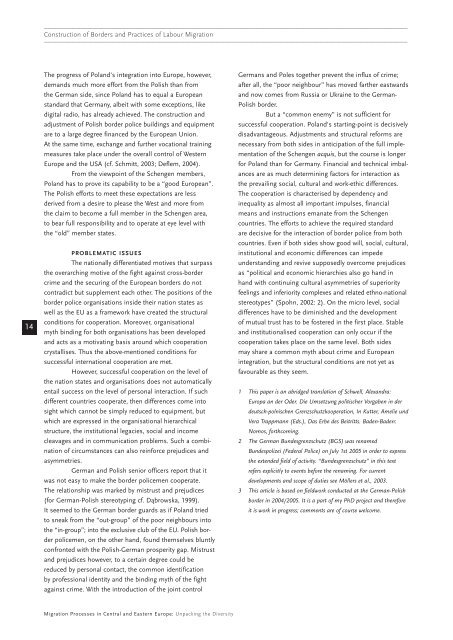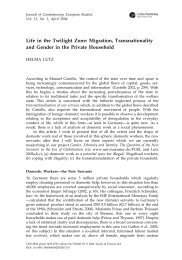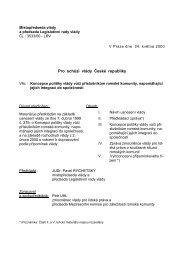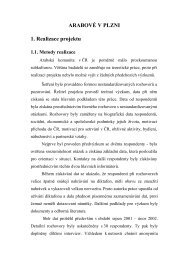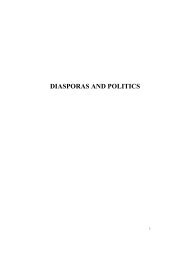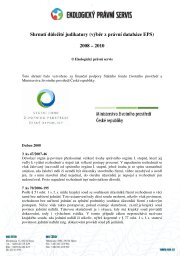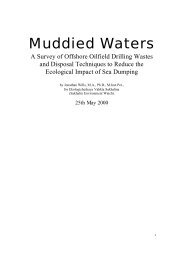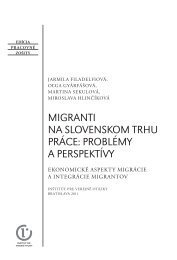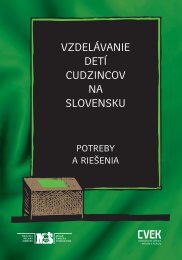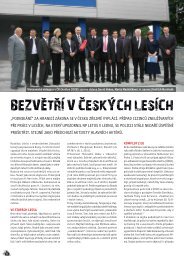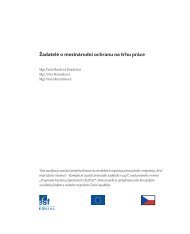Migration Processes in Central and Eastern Europe - Multiple Choices
Migration Processes in Central and Eastern Europe - Multiple Choices
Migration Processes in Central and Eastern Europe - Multiple Choices
You also want an ePaper? Increase the reach of your titles
YUMPU automatically turns print PDFs into web optimized ePapers that Google loves.
———————————————————————————————————————————————————————————————<br />
Construction of Borders <strong>and</strong> Practices of Labour <strong>Migration</strong><br />
———————————————————————————————————————————————————————————————<br />
14<br />
The progress of Pol<strong>and</strong>'s <strong>in</strong>tegration <strong>in</strong>to <strong>Europe</strong>, however,<br />
dem<strong>and</strong>s much more effort from the Polish than from<br />
the German side, s<strong>in</strong>ce Pol<strong>and</strong> has to equal a <strong>Europe</strong>an<br />
st<strong>and</strong>ard that Germany, albeit with some exceptions, like<br />
digital radio, has already achieved. The construction <strong>and</strong><br />
adjustment of Polish border police build<strong>in</strong>gs <strong>and</strong> equipment<br />
are to a large degree f<strong>in</strong>anced by the <strong>Europe</strong>an Union.<br />
At the same time, exchange <strong>and</strong> further vocational tra<strong>in</strong><strong>in</strong>g<br />
measures take place under the overall control of Western<br />
<strong>Europe</strong> <strong>and</strong> the USA (cf. Schmitt, 2003; Deflem, 2004).<br />
From the viewpo<strong>in</strong>t of the Schengen members,<br />
Pol<strong>and</strong> has to prove its capability to be a “good <strong>Europe</strong>an”.<br />
The Polish efforts to meet these expectations are less<br />
derived from a desire to please the West <strong>and</strong> more from<br />
the claim to become a full member <strong>in</strong> the Schengen area,<br />
to bear full responsibility <strong>and</strong> to operate at eye level with<br />
the “old” member states.<br />
PROBLEMATIC ISSUES<br />
The nationally differentiated motives that surpass<br />
the overarch<strong>in</strong>g motive of the fight aga<strong>in</strong>st cross-border<br />
crime <strong>and</strong> the secur<strong>in</strong>g of the <strong>Europe</strong>an borders do not<br />
contradict but supplement each other. The positions of the<br />
border police organisations <strong>in</strong>side their nation states as<br />
well as the EU as a framework have created the structural<br />
conditions for cooperation. Moreover, organisational<br />
myth b<strong>in</strong>d<strong>in</strong>g for both organisations has been developed<br />
<strong>and</strong> acts as a motivat<strong>in</strong>g basis around which cooperation<br />
crystallises. Thus the above-mentioned conditions for<br />
successful <strong>in</strong>ternational cooperation are met.<br />
However, successful cooperation on the level of<br />
the nation states <strong>and</strong> organisations does not automatically<br />
entail success on the level of personal <strong>in</strong>teraction. If such<br />
different countries cooperate, then differences come <strong>in</strong>to<br />
sight which cannot be simply reduced to equipment, but<br />
which are expressed <strong>in</strong> the organisational hierarchical<br />
structure, the <strong>in</strong>stitutional legacies, social <strong>and</strong> <strong>in</strong>come<br />
cleavages <strong>and</strong> <strong>in</strong> communication problems. Such a comb<strong>in</strong>ation<br />
of circumstances can also re<strong>in</strong>force prejudices <strong>and</strong><br />
asymmetries.<br />
German <strong>and</strong> Polish senior officers report that it<br />
was not easy to make the border policemen cooperate.<br />
The relationship was marked by mistrust <strong>and</strong> prejudices<br />
(for German-Polish stereotyp<strong>in</strong>g cf. Dąbrowska, 1999).<br />
It seemed to the German border guards as if Pol<strong>and</strong> tried<br />
to sneak from the “out-group” of the poor neighbours <strong>in</strong>to<br />
the “<strong>in</strong>-group”; <strong>in</strong>to the exclusive club of the EU. Polish border<br />
policemen, on the other h<strong>and</strong>, found themselves bluntly<br />
confronted with the Polish-German prosperity gap. Mistrust<br />
<strong>and</strong> prejudices however, to a certa<strong>in</strong> degree could be<br />
reduced by personal contact, the common identification<br />
by professional identity <strong>and</strong> the b<strong>in</strong>d<strong>in</strong>g myth of the fight<br />
aga<strong>in</strong>st crime. With the <strong>in</strong>troduction of the jo<strong>in</strong>t control<br />
Germans <strong>and</strong> Poles together prevent the <strong>in</strong>flux of crime;<br />
after all, the “poor neighbour” has moved farther eastwards<br />
<strong>and</strong> now comes from Russia or Ukra<strong>in</strong>e to the German-<br />
Polish border.<br />
But a “common enemy” is not sufficient for<br />
successful cooperation. Pol<strong>and</strong>'s start<strong>in</strong>g-po<strong>in</strong>t is decisively<br />
disadvantageous. Adjustments <strong>and</strong> structural reforms are<br />
necessary from both sides <strong>in</strong> anticipation of the full implementation<br />
of the Schengen acquis, but the course is longer<br />
for Pol<strong>and</strong> than for Germany. F<strong>in</strong>ancial <strong>and</strong> technical imbalances<br />
are as much determ<strong>in</strong><strong>in</strong>g factors for <strong>in</strong>teraction as<br />
the prevail<strong>in</strong>g social, cultural <strong>and</strong> work-ethic differences.<br />
The cooperation is characterised by dependency <strong>and</strong><br />
<strong>in</strong>equality as almost all important impulses, f<strong>in</strong>ancial<br />
means <strong>and</strong> <strong>in</strong>structions emanate from the Schengen<br />
countries. The efforts to achieve the required st<strong>and</strong>ard<br />
are decisive for the <strong>in</strong>teraction of border police from both<br />
countries. Even if both sides show good will, social, cultural,<br />
<strong>in</strong>stitutional <strong>and</strong> economic differences can impede<br />
underst<strong>and</strong><strong>in</strong>g <strong>and</strong> revive supposedly overcome prejudices<br />
as “political <strong>and</strong> economic hierarchies also go h<strong>and</strong> <strong>in</strong><br />
h<strong>and</strong> with cont<strong>in</strong>u<strong>in</strong>g cultural asymmetries of superiority<br />
feel<strong>in</strong>gs <strong>and</strong> <strong>in</strong>feriority complexes <strong>and</strong> related ethno-national<br />
stereotypes” (Spohn, 2002: 2). On the micro level, social<br />
differences have to be dim<strong>in</strong>ished <strong>and</strong> the development<br />
of mutual trust has to be fostered <strong>in</strong> the first place. Stable<br />
<strong>and</strong> <strong>in</strong>stitutionalised cooperation can only occur if the<br />
cooperation takes place on the same level. Both sides<br />
may share a common myth about crime <strong>and</strong> <strong>Europe</strong>an<br />
<strong>in</strong>tegration, but the structural conditions are not yet as<br />
favourable as they seem.<br />
1 This paper is an abridged translation of Schwell, Alex<strong>and</strong>ra:<br />
Europa an der Oder. Die Umsetzung politischer Vorgaben <strong>in</strong> der<br />
deutsch-polnischen Grenzschutzkooperation, In Kutter, Amelie und<br />
Vera Trappmann (Eds.), Das Erbe des Beitritts. Baden-Baden:<br />
Nomos, forthcom<strong>in</strong>g.<br />
2 The German Bundesgrenzschutz (BGS) was renamed<br />
Bundespolizei (Federal Police) on July 1st 2005 <strong>in</strong> order to express<br />
the extended field of activity. “Bundesgrenzschutz” <strong>in</strong> this text<br />
refers explicitly to events before the renam<strong>in</strong>g. For current<br />
developments <strong>and</strong> scope of duties see Möllers et al., 2003.<br />
3 This article is based on fieldwork conducted at the German-Polish<br />
border <strong>in</strong> 2004/2005. It is a part of my PhD project <strong>and</strong> therefore<br />
it is work <strong>in</strong> progress; comments are of course welcome.<br />
<strong>Migration</strong> <strong>Processes</strong> <strong>in</strong> <strong>Central</strong> <strong>and</strong> <strong>Eastern</strong> <strong>Europe</strong>: Unpack<strong>in</strong>g the Diversity


